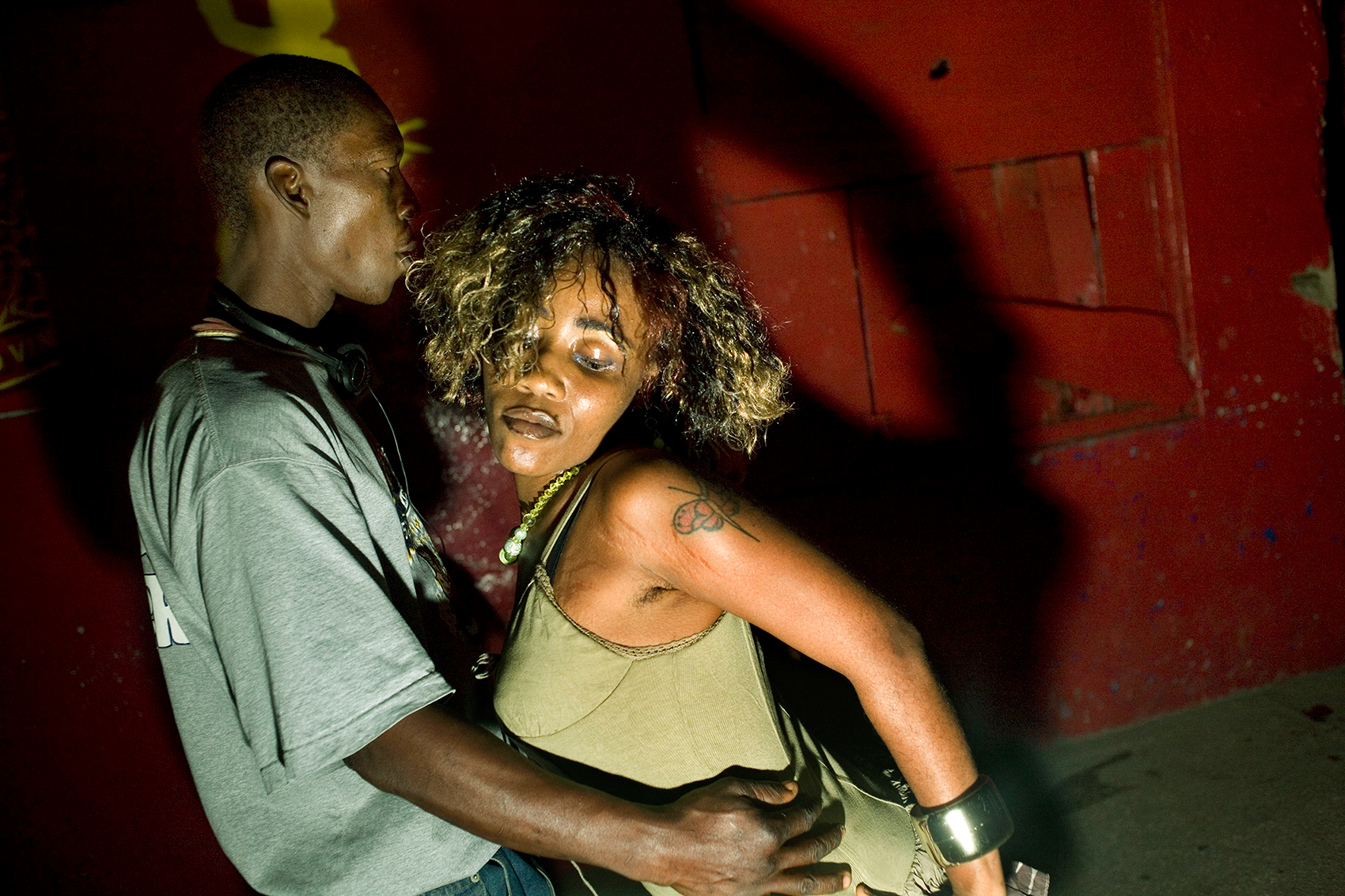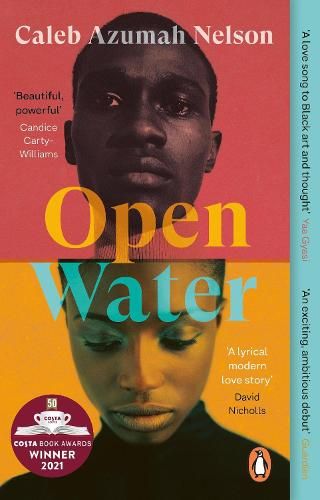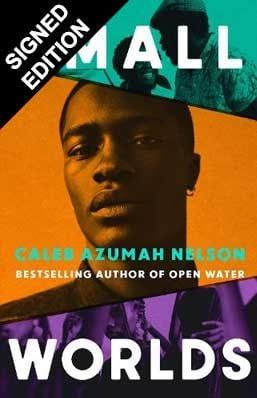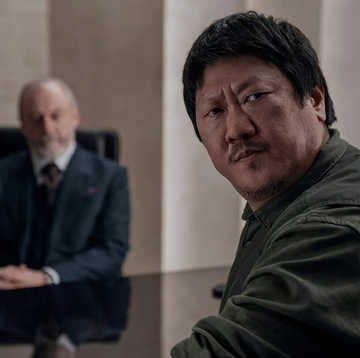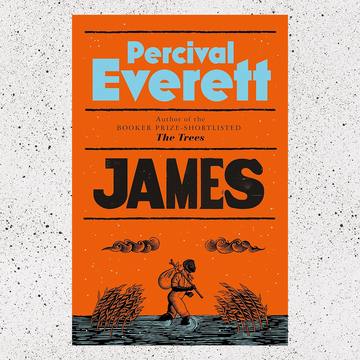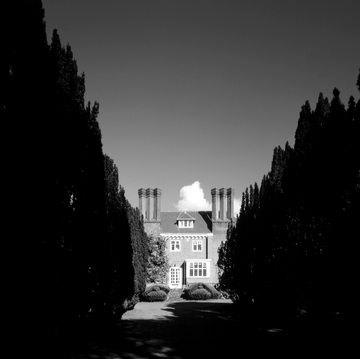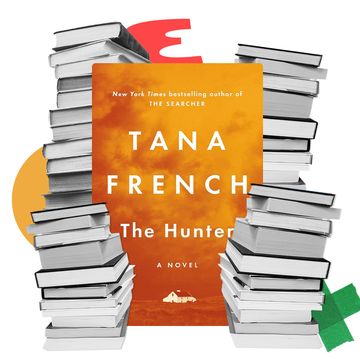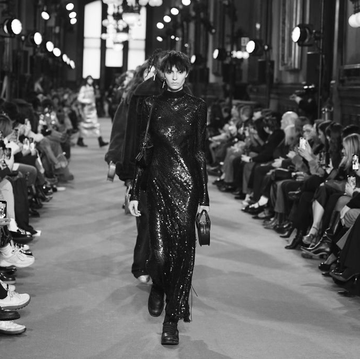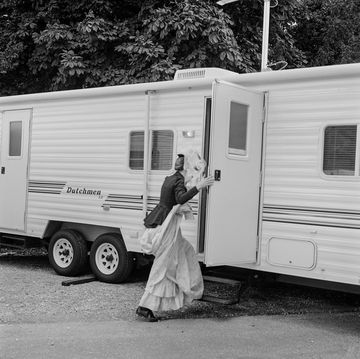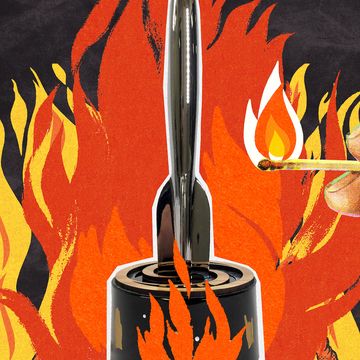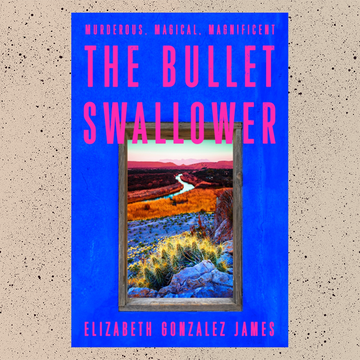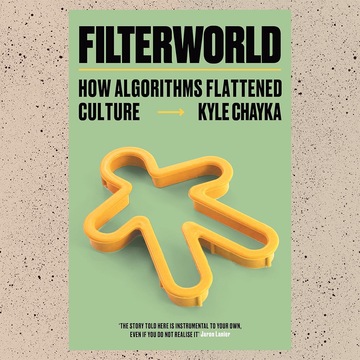Our parents always said Accra in December felt like Christmas in the summertime. That it was not to be missed. So this year, my brother Stephen and I make the trip. It’s our second time in a year – last time, for Auntie Yaa’s funeral, but this time, for her celebration of life. We tell no one we’re going. Our bags are full of our own possessions, rather than those of relatives, who, on hearing there’s a trip being made back home, will pass by unannounced, linger in the doorway, before thrusting any number of wrapped packages in your direction. No, this time round, we book our tickets in secret, only texting our friends in Accra once we’re off the plane and the heat at Kotoka International Airport begins to lap at our skin. This time round, our plan is to celebrate rather than mourn, to make footprints in the sand at Labadi Beach, where the day stays a breathless blue. We want to go to Independence Square for concerts, to hit after-parties which trail off into the brightness of dawn.
Today, after another late night, I awake too early to a rooster’s caw. From downstairs, I can hear Stephen already up, muffled music playing. My eyes are barely open but I make my way by memory and feel. Like Auntie Yaa’s home in London, her Accra house feels like a little world in of its own, a place to pause and rest and be still.
Downstairs, I take my usual spot at the table, rub the sleep from my eyes. I hear the echoes of Auntie Yaa’s teasing – you look like you enjoyed yourself too much! – and the memory of her smile produces one of my own. Whenever Stephen or I had been out all night, we would route back via her café in Peckham, or her home above the shop, where she was already awake in the early hours of the morning. She would boil the kettle, crack eggs into a pan, feed us with food and her softness, letting us crash in her spare room for a few hours before work. Always there.
In her place, Stephen soon appears, sliding a plate of eggs my way, as the next song starts. I recognise the flourish of Alfa Mist’s keys coming from the speakers, and I’m glad that we brought those records with us; glad some part of London, some part of home, followed us here. Stephen’s due to leave in a few hours, and maybe I’ll ask him if I can hold on to the records, so when it is just me, I might tempt others over with the promise of sound. It’s company I need and crave, not solitude.
Stephen fixes his own plate and joins me, tucking his long limbs under the dining table, the flash of his broad and brilliant smile, automatic. We’re both in the business of warping and stretching time; meals often become space for debates, or a game of cards, or those unexpected moments when something spills.
Sure enough, after a few forkfuls of his breakfast, Stephen raises a hand decorated with several rings, a scar running across his palm from an unfocussed moment at our restaurant, and says, “Top five. Dead or alive.”
“Rappers?”
“Yep.”
“Hmm.” I consider. “Kendrick.”
“That’s a given.” He puts down a finger.
“Jay-Z.”
“He has one good album but cool.” Another finger goes down.
“We’ll come back to that. Erm. 50 Cent.”
Stephen lays his palm on the table, amused concern on his face.
“What?” I say. “He’s culturally significant.”
“Culturally significant? Sure you’re not still stoned?"
“Alright, give me yours then.”
“Easy,” he says. “Kendrick, Tupac, Rakim, Andre 3000,
Missy Elliott.”
“You had your answer ready? This guy.”
A laugh slips from Stephen as he nudges food around his plate. Takes a glance my way. “You gonna be alright on your own?”
I say, “I’m older than you, remember?”
Stephen doesn’t shift his gaze.
“Tony and Kwame are still here. I’ll be fine.”
“There’s some food in the fridge,” he says. “I don’t want you to starve.”
“I love you too, Stephen.”
At this, he smiles, but doesn’t push anymore, for which
I’m grateful.
Several hours after Stephen and I make the short drive in the rental to the airport, Accra’s bustling streets flashing past us, and I’ve helped him unload his suitcase, and I don’t want to say goodbye, or rather, I worry that my goodbye won’t show all I am feeling; several hours after he waves away my suggestions to accompany him to security, reminding me of the car, you’ll get towed, instead pulling me in close, my head against the crook of his neck, and, after the clasp of hands, a growing distance, the rhythm of his walk like one last song; several hours after all this, I pull back up to Auntie Yaa’s spot, which, now, feels emptier than it has ever done.
I try to send sound through the rooms, playing the record Stephen and I danced to the night before – Marvin Gaye’s “I Want You” – as loud as it will go. The longing eases a little; my confidence grows and I sing the chorus. This is the best way to spend this first evening alone, I think, with music, with rhythm, with ghosts fresh and long gone, my movements and these notes haunting a space which, since Auntie Yaa passed, has haunted me. I’m thinking that tomorrow, it would only make sense to recruit Tony and Kwame and whoever else we can gather, to fill these rooms with people and sounds, to drink or smoke until we’re a little rowdy, a little boisterous, whatever it takes to make the trip to a bar or club, to a dancefloor filled with strangers.
I’m thinking, I should just call them now, when all at once the lights go out.
“Damn,” I say, out loud, unhooking the torch from the kitchen wall, heading towards the garage. It’s the first instance of dumsor since I’ve been here. In the corner of the garage, I find the backup generator. There’s a set of instructions taped to the top. I run my finger across Auntie Yaa’s scrawl, and go through each step, like she’s watching, and fondly shaking her head. After several tries, there’s still no rattle or purr from the engine.
I give up and go and sit out in the yard, where starlight speckles the sky, the moon hiding for the night. From my pocket, I pick out a joint Stephen clumsily rolled earlier and light it. As I smoke, the whine of mosquitoes, the distant chatter of Accra welcoming the night. The smoke slows my mind. I sing to myself, and when I get hungry, I hum all the way to the kyinkyinga a couple of streets away.
There are mostly young people in the queue, lining their stomachs before the night begins. I hear a woman complaining about the dumsor, kissing her teeth. Our eyes meet as she speaks and I can’t help but smile, which she returns, shaking her head. I like the dimples in her cheeks, the joy journeying from her mouth to her eyes, alight even in the darkness of the early evening.
“You’d think,” she says, loud enough for me to be included, “with all the bribes, they’d have enough money to sort it out.”
“Oh, come on,” I say, playful. “You know the money, dey just chop.”
Murmurs of amused agreement all round. I check a text from Stephen – plane is finally taking off – and when I glance back at her, she’s still looking at me, curious; our eyes meet again but just for a moment. She turns back to her friends, and I collect my order,
making the short journey home, the fat of the kebabs and yam soiling the bag.
Back in the yard of Auntie Yaa’s house, I tear open the bag, let the contents splay on the outdoor table. I eat quickly, messily, until I’m full, until the satisfaction weighs on my eyelids. I’m thinking about rolling another joint, when Kwame calls, saying how far?
He tells me there’s a group heading to a spot in North Ridge where there’s live music playing; he’ll pick me up.
I wake the next morning, heavy legged, my vision a cloud. Through one eye, a woman lying beside me. I try to place where I know her from and it’s when she rolls towards me that I recognise the gaze from the kyinkyinga, the slight smile in her eyes.
“You were snoring.” When I don’t say anything, “It’s probably the alcohol.”
I recognise the slightly sour taste on my tongue.
“Did we…”
She nods. She must catch the worry on my face because she says, “It was good. We had fun.”
“I can only take your word for that,” I say. “Could’ve been the worst first date ever.”
“For you or for me?”
“Oh, for me, definitely,” I say, teasing.
“I need to get the night off me,” I say, rolling away from her, heading towards the bathroom. I let the shower run and try to snatch fragments of last night. I hear the pad of footsteps coming from the bedroom, and she hovers by the doorway, then comes in, gesturing towards the running water.
“Do you mind?”
I shake my head. She slides off the t-shirt of mine she has been wearing, and, with her back towards me, twists her braids into a bun, holding out her arm to test the shower, before stepping in. My body must betray my hesitation; through the fogged glass, I see her motion come. Before I can change my mind, I take off my shorts, pull off my own tee. It’s been so long since I undressed in front of a stranger, sober, but her ease encourages some of my own. Stepping into the shower to join her, it feels like there’s nothing to cover.
“What your name?” I ask. I’m splitting the skin of a plantain about to turn, which I’ll slice and fry, eat with some of the red red Stephen cooked before he left.
“Akuoko. But friends call me AK.”
“I’m Ray.”
“I know,” she says, amused.
“You’re a twin?” I say. She frowns a little. “Akuoko. It means twin, right?”
“I was.”
“Oh,” I say. “I’m sorry.”
She shrugs, folding her arms, pulling into herself.
“You OK?” I ask.
She turns towards me after a moment, as if she had forgotten I was there.
“Yeah.”
She opens the fridge, pulls out a beer for her, for me, but I raise my hand to say no.
“I don’t really drink.”
“What do you call last night?”
“A relapse.”
“You’re an alcoholic?”
“More like… preventative measures. I don’t think it would take much for me to get there.”
As we eat, the sun slides in through the horizontal blinds, resting gently on the dining table. The photos of Auntie Yaa and her relatives watch us from the walls. I prod Akuoko for more details of the night before. She says she spotted me at the bar, recognising me from the kyinkyinga. She was with some old friends, who saw the flit of her eye in my direction. When the dancing started and our groups met in the space in front of the band, we split away, our bodies speaking things our mouths didn’t have language for. That’s when here, now, Akuoko scoots back in her chair, and takes my hand, leading me back to my bedroom.
Our first few kisses are shy and stuttered but we soon find a rhythm, one which is as familiar as it a surprise. Her soft sighs echo through the room; there’s a deep, low rumble which I realise is a groan from my chest. The fan whirrs overhead but we’re soon hoarse, we’re soon sweat. Her head tucked into the crook of my neck, my hand pressed on the bed to steady us, the other wrapped around the curve of her back. I don’t think we can get any closer, and then we do, and I’m going somewhere past myself, and she’s meeting me there.
And then, we’re lying side by side, a little breathless in the early afternoon light which rests against the bare walls and clothes spilling out of an open suitcase.
“Why don’t you drink much?”
“Well, for starters, the memory loss.”
Akuoko smiles, shaking her head, dissatisfied.
I shrug. “I become a different person.”
“I liked him just fine. Besides, it was you. A version of you.”
“My dad used to drink,” I say. “A lot. And then I started to do the same. I was just quite messy. I’m an emotional drunk.”
“You are.”
“Don’t tell me I cried last night too…”
“No,” she says, smiling as she picks her words. “You were… joyous. You just clearly feel a lot. I mean that in the best of ways.”
I feel her gaze on me and turn to meet it.
“It takes a lot of courage to want something more for yourself,” she says. “A lot of love too.” She edges closer to me, until she can rest her head on my chest. Her breathing steadies and slows. My mind drifts to a conversation with Stephen a few days ago, at a chop bar near Cantonments, where we spoke about permanence, him arguing that everything is in flux, that loss is constant, that we’re always mourning moments just passed, but these moments of intimacy make life worth living. In this moment, her head rising and falling with my chest, as the whirr of the fan leads me towards sleep, I can’t help but agree.
“Mist of a Dream” approaches its end and I stand from where we’re sprawled on the sofa in the living room to change the record. “Do you know anywhere I can get a passport photo taken? I need to get a Ghana Card before I leave,” I say.
“I can do it for you.” I turn to face her, eyebrows raised. “I’m a photographer,” she says.
“That explains it.”
“Explains what?”
“That look you have. Like you can see everything.”
She smiles, looking down into her lap, before saying, “We could do it now.”
“Now?”
She shrugs. “Unless you’re doing something. I have a studio I use when I’m here. It’s not far.”
We go from North Kaneshie, down to Osu, getting lucky with traffic, pulling up to a single storey building painted white and blue. Outside, the heat does not relent, and Accra chirps with energy, under your feet, in the air. But the moment we step inside, the world quietens. It’s cooler in the studio space, but not sterile, stacks of books holding up one of the walls, an off-white backdrop pinned to another. There’s a little skylight, angled so that sunshine grazes the stool I assume someone might sit on for a portrait.
“Is it just you here?”
Akuoko shakes her head. “Six of us share it. But I think it’ll just be us here today. Sit,” she says, gesturing.
I perch on the stool, the only seating I can see. She takes a camera off the shelf and raises it to meet her eye, twists the lens back and forth, until, satisfied, she lets the camera dangle by her side and asks, “Ready?” I nod and lift my chin as she raises the camera back to her eye.
“Relax,” she says. “You’re good here.” I feel my shoulders slide down a little and I let out a long exhale. “There.” A click, several more. She looks down on a little screen on the camera and says, “Done. Easy. Let’s get these printed for you.”
Through a doorway, into the next room, is chaos. A pair of monitors on either side of the room, bottles of chemicals piled haphazardly on the shelves, photographs, everywhere, on the desks, the doors, the walls. She takes a seat at one of the monitors and taps at the keyboard.
“What are those for?” I say, pointing to the chemicals on the shelf.
“Stuff to develop with – I usually make images on film.”
“Man.” I shake my head. “How do you know the image is gonna come out? When you’re developing it?”
“Faith,” she says, laughing, returning to the monitor.
There’s a set of images above, pinned to the wall. It’s Akuoko, perhaps a few years before, with a woman who could only be her twin. A black and white-checked background, clasping hands, their bodies with a slight lean towards each other, as if acknowledging their pull, their connection.
She sees me staring. “We used to make self-portraits together all the time. She was a painter, had a great eye. I guess it was a nice way of seeing ourselves, and kinda accepting that we’d always be together.”
I don’t know if she wants to say more, so I go softly.
“How long ago did she pass?”
“A few years,” she says, her shoulders hunching, pulling into herself again. The silence returns.
I consider for a moment. “Would you show me how to do it? To develop film? My brother and his girlfriend, they shoot on these old cameras. I dunno, he’s the artistic one, but it would be cool to learn how to do something like that. Maybe tomorrow? Or next week? I’m here for a while longer.”
“I leave tomorrow. Back to New York. I’m only visiting.”
“Oh.” I say. “I didn’t realise.”
“You didn’t ask,” she says. The printer huffs out a small page of images, a little gallery of my face, which she hands to me.
“Thank you,” I say. “How much do I owe you?”
She shakes her head, sharply, as if I’m ridiculous and I don’t fight her on it. Neither of us talk until we get back in the car, both aware that a world exists outside of the one we’ve made; a world subject to time’s violence, its constant crumbling.
Starting up the engine, I ask if she needs me to drop her home, to pack. She pauses for a moment, before, shyly, asking if she can come back with me. Of course, I say, putting the car in gear, feeling relief I didn’t know I needed. Of course, you can.
I’m in the business of stretching and warping time, so back at Auntie Yaa’s, we stuff months into hours, letting music sound out through the house. We play one record, then another, until we’re going back to back, gesticulating as we tell the story of each, “The Line” playing as she tells me about seeing D’Angelo at the Apollo after four cancelled concerts, and it being worth it for this song and this song alone; “Booo!” spinning as I describe the frenzy of the first rave I went to in London, the bass shaking my bones. She tells me of New York, growing up in Harlem, of her photography practice, of trying to find ways not only to see others but to see herself; I tell her of London, growing up in Peckham, of opening a restaurant with Stephen, selling West African cuisine on the same street we grew up on, making small worlds where grace and care are at the fore.
When we get hungry, I wash rice and set it to boil with a little too much water, so that it might thicken and stick as I shape it for omo tuo. There’s some groundnut soup in the fridge which Stephen cooked earlier in the week, and as I place this on the stove on low, Akuoko appears with a glass of Fanta and ice, placing it on the counter, before wrapping her arms around my waist, leaning her head against my back as I stir.
As we sit to eat at the table, she asks, “Whose house is this?”
“My Auntie Yaa.” I take another spoonful, but she’s patient, watching me as I chew.
“She didn’t have any children, left this place for me and my brother. This is our first time back since…” I lose the words.
“You came for the funeral,” she says, her hand finding mine.
“It was more like a party. It was madness and so beautiful. She was insistent that there was only celebration, that we should mourn but not for too long. That we should come and say goodbye, then go on with our lives.”
“Tell me about her.”
“She was the only person who could match my teasing,” I say, smiling. “And always full of energy. She had a gaze like yours, like she knew stuff we all didn’t. She looked out for everyone. Looked out for me.”
“And here you are passing it along.” Placing her spoon down, she says, “I couldn’t go to my sister’s funeral. I just couldn’t go.”
“Why?”
“Don’t do that,” she says, sharp. “I did what I had to do at the time. I wasn’t ready to say goodbye.”
Now it’s my turn to reach for her hand. I feel it soften in mine. Her eyes threaten tears but they don’t drop.
“Is that why you’re in Ghana?”
She nods.
“Did you get to say goodbye this time?”
She nods again.
“Then that’s all that matters.”
It’s December but it’s always summer here. As darkness falls and the climate cools a little, Akuoko heads home to get changed and she returns, as promised, with some friends. Tony and Kwame arrive half an hour later, and after some drinking, some smoking, we head back to North Ridge, to where this time started.
At the bar, her hand on my knee, mine on hers. We shout over the music, finally exchanging details, promising to write or call, or visit, whatever. But we don’t dwell on this, making for that space in front of the band, where we might edge closer to one another, where our bodies might say things that we don’t have the language for. Even without the alcohol, I’m messy and emotional, I’m all flailed movements and scattered notes.
When the band plays its last song, we decline another party, splitting away from the group. It’s only a short ride home in the taxi, and when the fuzz of the radio plays “Otoolege”, despite tiredness clutching at us, we sing along.
Back in the bedroom, with the first of the day’s light breaking into the room, sitting on the edge of the bed, I begin to cry, finally, for Auntie Yaa. I cry for ghosts fresh and long gone. I mourn the moments which haven’t passed yet, but I know are inevitable. I go to cover my eyes, but she takes my hand, wipes away my tears.
“You’re good here,” she says. And she’s right. There’s nothing to cover. No shame to hide.
When I wake up, I’m alone, and the t-shirts she wore are folded at the foot of the bed. And yet, downstairs, I can still sense our pleasant drift, our ordinariness, the tenderness of her touch. I go to put on a record, and the gloss of a photograph on the dining table catches my eye. It’s an image of me, at the bar, I assume, on the night we met. My eyes are closed, my arms raised, caught between somewhere, some brief transcendence taking place. I look as if I’m in some kind of rapture. Turning the image over, scrawled across the back is not a farewell note, but a single a word: Soon.
This short story appears in the Summer 2023 issue of Esquire. Caleb Azumah Nelson's new novel, Small Worlds, is out now.
